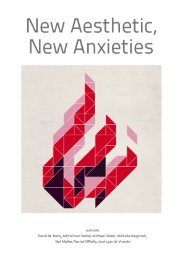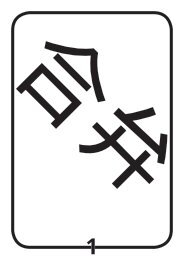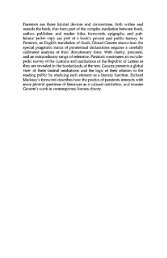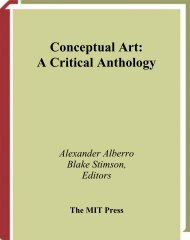Create successful ePaper yourself
Turn your PDF publications into a flip-book with our unique Google optimized e-Paper software.
Group Materia!<br />
On Democracy// 1990<br />
The US collective Group Material began working in the late 1970s, producing<br />
collaborative exhibitions with residents of their neighbourhood in Manhattan.<br />
Throughout the 1980s their projects grew more critical of the Republican<br />
government, particularly its policy on AIDS. The following text introduces<br />
Democracy, a conference and installation project they organized at the Dia Arts<br />
Foundation, New York, in 1988.<br />
Participating in the system doesn't mean that we mLlst identify with it, stop<br />
criticizing it, or stop improving the little piece of turf on which we operate.<br />
- Judge Bruce Wright, Justice, New York State Supreme Court.<br />
Ideally, democracy is a system in which political power rests with the people: all<br />
citizens actively participate in the process of self-representation and selfgoverning,<br />
an ongoing discussion in which a multitude of diverse voices<br />
converge. But in 1987, after almost two terms of the Reagan presidency and with<br />
another election year at hand, it was clear that the state of American democracy<br />
was in no way id,eal. Access to political power was obstructed in complex ways,<br />
participation in politics had degenerated into passive and symbolic involvement,<br />
and the current of 'official' politics precluded a diversity of viewpoints. When<br />
the Dia Art Foundation approached Us with the idea of doing a project, it was<br />
immediately apparent to us that democracy should serve as the theme.<br />
The subject of democracy not only became our content but influenced our<br />
method of working. This theme prompted a greater awareness of our own<br />
process. One of the first questions we asked was: 'Why are they asking us?' To<br />
us, the Dia Art Foundation signified 'exclusive', 'white', 'esoteric', and 'male',<br />
whereas we had always attempted to redefine culture around an opposing set of<br />
terms: 'inclusive', 'multicultural', 'nonsexist', and 'socially relevant'. In general,<br />
we see ourselves as the outspoken distant relative at the annual reunion who<br />
can be counted on to bring up the one subject no one wants to talk about.<br />
The subject that no one in the art world wants to talk about is usually politics.<br />
Yet, because every social or cultural relationship is a political one, we regard an<br />
understanding of the link between politics and culture as essential. 'Politics'<br />
cannot be restricted to those arenas stipulated as such by professional politicians.<br />
Indeed, it is fundamental to our methodology to question every aspect of our<br />
cultural situation from a political point of view, to ask, 'What politics inform<br />
Group Materialj/On Democracy// 135








